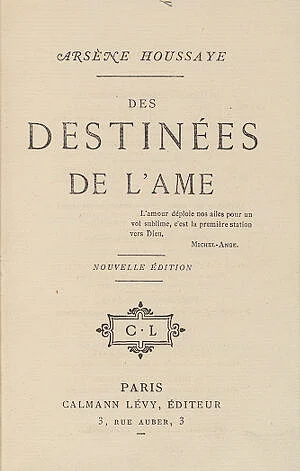Harvard Library has recently made headlines by announcing the removal of a book that had been a part of its collection for almost a century. The reason? This particular tome, known as "Des Destinées de L'ame" ("Destinies of the Soul"), had a macabre history—it was partially bound with human skin taken without consent from a deceased hospital patient.
Harvard Library Removes Book Bound in Human Skin After Nearly A Century. What Is The Reason?
The book, originally published in 1879, was partially bound with human skin taken without consent from a deceased patient. Find out the reason behind Harvard Library’s decision to remove the book.

The unsettling revelation came to light when the library disclosed that the book, originally published by Arsène Houssaye in 1879, had undergone a grim transformation at the hands of its first owner, Dr. Ludovic Bouland, a French physician. Bouland, as per Harvard Library's account, had taken skin from the body of a deceased female patient, without her consent, during his tenure at a hospital.
Bouland justified his ghastly act by inscribing a handwritten note within the book, proclaiming that "a book about the human soul deserved to have a human covering." Tom Hyry, associate university librarian for archives and special collections, highlighted this disturbing detail in a recent update provided by Harvard Library.

"Evidence indicates that Bouland bound the book with skin taken from a woman, acquired during his time as a medical student," Hyry revealed. "A memo accompanying the book, authored by John Stetson, which has regrettably been misplaced, informed us that Bouland obtained this skin from an unidentified deceased woman patient at a French psychiatric hospital."
Although Bouland passed away in 1933, the book found its way into Harvard's collection in 1934 on a deposit basis. Subsequently, in 1954, it was formally donated to the university. A description of the skin treatment process, necessary for binding the book, was included in the deposit note. In 2014, Harvard Library conducted tests confirming that the binding indeed comprised human remains.
Until recently, the book had been accessible to all who sought it, irrespective of their motives. However, Harvard Library acknowledges past oversights in its handling of the book, conceding to a tradition where students were hazed by being tasked with retrieving it without full knowledge of its contents.
Anne-Marie Eze, associate librarian of Harvard's Houghton Library, emphasized that the book's removal marked the culmination of years of deliberation, aligning with the university's broader initiative to address human remains within its collections.
The removal of "Des Destinées de L'ame" reflects a broader introspection within Harvard University regarding its historical collections. In 2022, the university published a report on human remains found in its various repositories, shedding light on past injustices and prompting a reassessment of ethical practices.
The library is now engaged in further research concerning the book, Bouland, and the anonymous female patient whose skin was utilized. The skin itself is securely stored at Harvard Library, with efforts underway to coordinate with French authorities for its respectful disposition.
As a testament to transparency, the book has been fully digitized, albeit without its macabre covering, and made available online for public access. Harvard Library assures that the book will henceforth be accessible to researchers solely in its de-skinned form.
"The crux of the issue lies in a doctor's dehumanization of a patient, reducing her to a mere object for his scholarly pursuits," remarked Hyry. "It is high time these remains are accorded the dignity and respect they deserve."
- Previous Story
 US Elections 2024: Tim Walz, JD Vance To Go Head-To-Head In VP Debate | Key Issues To Watch Out For
US Elections 2024: Tim Walz, JD Vance To Go Head-To-Head In VP Debate | Key Issues To Watch Out For - Next Story


























